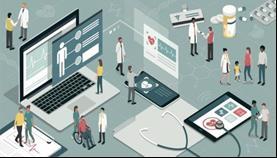
2 minute read
Misinformation (Lin Zhao
One aspect with health literacy is the ability to recognize misinformation given vast prevalence and trends in how they contribute to decision-making when it pertains to individual health. In other words, people with high health literacy can generally distinguish between misinformation and credible knowledge. As access to the internet is usually available to the general public, it is just as easy to come upon misinformation as credible material. Thus, in route to improving health literacy, it is important to recognize what is considered as health misinformation and where the problem is most prevalent.
For starters, it is important to recognize topics of misinformation and their prevalence when it comes to healthcare, especially on social media platforms, before coming up with solutions to regulate or address them in route to improving health literacy. One such study by Suarez-Lledo V et al. looked into this prevalence by first nailing down topics of misinformation most concerned with in scientific databases and then extrapolating the search with these topics to social media platforms like Twitter. The highest trending healthcare topics with regards to misinformation were found to focus on drugs, smoking products, and major public health issues like vaccines and diseases. Knowing this can help guide future support in the development of evidence-based digital policies or action plans that can focus on health misinformation - especially given that anybody from any part of the world can access social media resources. 1
Advertisement
Regarding the current pandemic, one infodemiology study found that 70% of the first 110 web sites encountered when searching up “Wuhan Coronavirus” resulted in low health accuracy scores. That is, the web sites providing health information on the novel coronavirus didn’t fall in line with the benchmarks used to assess for information accuracy such as Health on the Net Foundation Code of Conduct (HONcode), the Journal of the American Medical Association (JAMA), and the DISCERN instrument using Google ranking. And this is any web site - including ones outside of the US!2
As with solutions on the problem, assessing information with a healthcare professional has been one of the best ways in tackling misinformation. Given that credible sources such as medical databases tend to be riddled with jargon, health professionals play a big role in mediating this information on an understandable level for the common individual.
Opinion Tackling health misinformation is a lot of work seeing that, with the rise of the pandemic, much of it has been politicized or used to control public opinions across the globe. That is not to say there isn’t hope and solutions, but I think clinical or healthcare outreach to areas of low literacy should be one of the first steps in this endeavor as well as healthcare professionals already in the field continuously exercising professionalism, and reliability without judgement no matter the questions asked by anyone seeking confirmation on accuracy. ~ L. Zhao
Sources 1. Cuan-Baltazar JY, Muñoz-Perez MJ, Robledo-Vega C, Pérez-Zepeda MF, Soto-Vega E. Misinformation of COVID-19 on the Internet: Infodemiology Study. JMIR Public Health Surveill 2020;6(2):e18444. doi:10.2196/18444 2. Suarez-Lledo V, Alvarez-Galvez J. Prevalence of Health Misinformation on Social Media: Systematic Review. J Med Internet Res 2021;23:e17187. doi:10.2196/17187
Image: Health Literacy In The Age of Social media and Misinformation: A Conversation with Dr. Eileen Fry-Bowers. GroupSolver. https://www.groupsolver.com/2021/02/02/health-literacy-in- the-age-of-social-media-andmisinformation-a-conversation-with-dr-eileen-fry-bowers/. Accessed March 19, 2021.







